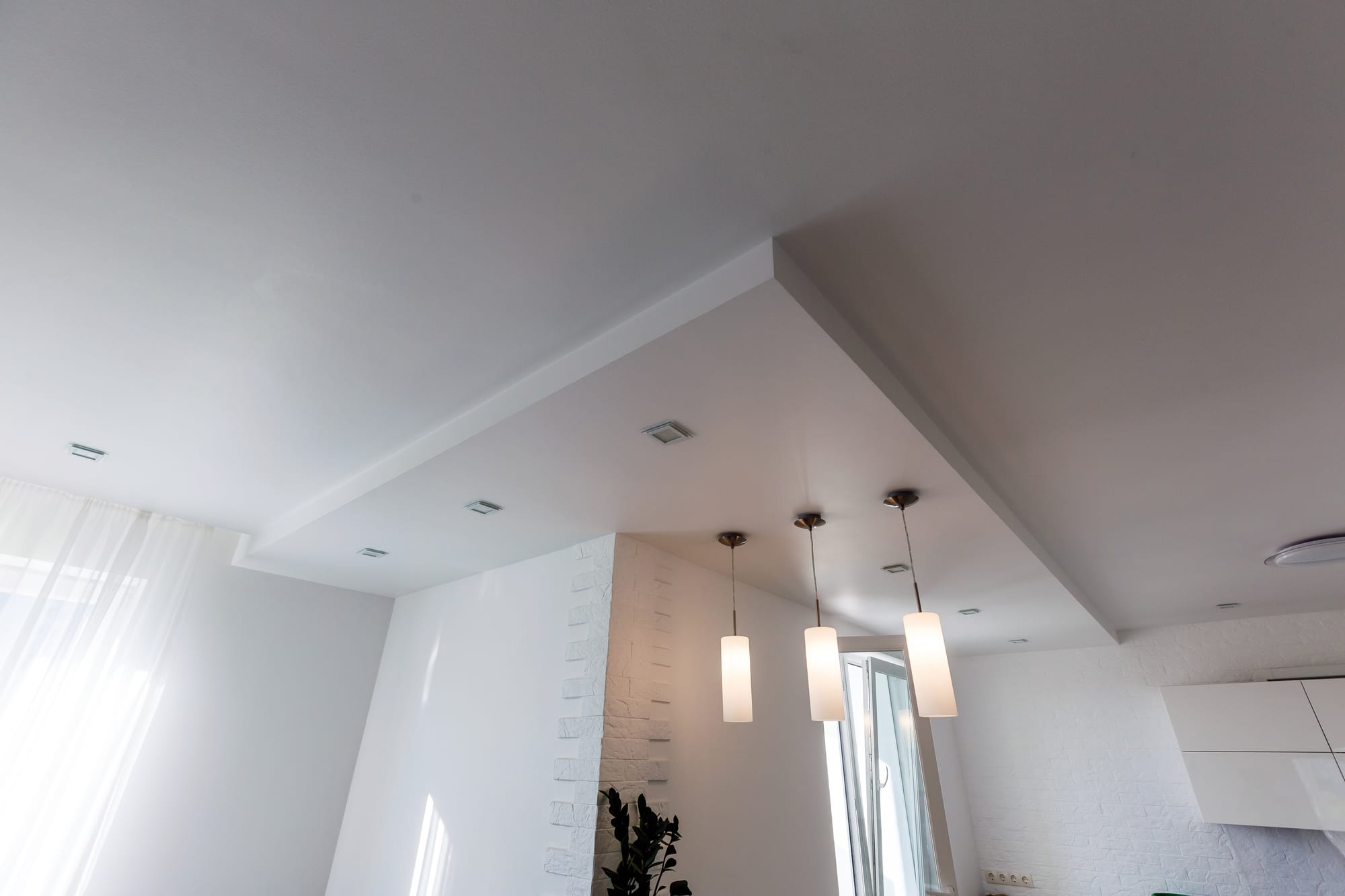How to Avoid Paint Flashing on Ceilings

Key Features
- Proper Surface Preparation: Cleaning and priming are essential to avoid flashing and achieve a smooth, even finish.
- Even Paint Application: Using the right roller and maintaining a wet edge helps in applying paint consistently, preventing flashing.
- Flat Finish for Ceilings: A flat or matte finish is ideal for minimizing imperfections and preventing sheen inconsistencies.
Avoiding Paint Flashing
Painting ceilings can be tricky, especially when it comes to avoiding paint flashing. Flashing occurs when there are visible uneven patches or sheen inconsistencies after the paint has dried. At Lightmen Painting, we know how frustrating this can be, but with a few careful steps, you can prevent flashing and achieve a beautiful, even finish on your ceiling. Let’s explore some tried-and-true methods to help you get that flawless look.
What Is Paint Flashing?
Paint flashing, also known as “flashing marks,” happens when paint doesn’t dry evenly, leading to an inconsistent sheen. This can make certain areas of your ceiling look shinier or duller compared to the rest. Flashing is usually a result of improper painting techniques, lack of proper surface preparation, or using the wrong type of paint. It’s most noticeable in ceilings due to the way light hits the surface from different angles.
Why Does Paint Flashing Happen?
Several factors can cause paint flashing, and understanding these reasons can help you prevent it:
1. Uneven Surface Preparation
Ceilings that aren't properly cleaned or primed can lead to flashing. Dust, oils, or stains can affect the way paint adheres, causing areas to dry with a different sheen.
2. Incorrect Primer Use
Using the wrong type of primer or skipping primer altogether can lead to uneven paint absorption. If the ceiling surface absorbs paint differently in some spots, it will create uneven sheen or flashing.
3. Applying Paint Unevenly
Inconsistent application—either by roller, brush, or spray—can also lead to flashing. If some areas have more or less paint than others, the difference becomes evident once it dries.
4. Inconsistent Lighting
Light, especially natural sunlight, can reveal flashing more clearly. Different lighting conditions can emphasize areas where the paint didn’t dry evenly, making flashing more apparent.
Things to Know
- Primer is crucial for achieving an even base and preventing flashing.
- Consistent application matters—using the right roller and maintaining a wet edge helps to avoid uneven sheen.
- Flat finishes work best on ceilings, minimizing light reflection and hiding imperfections.
- Lighting can highlight flaws, so ensure even lighting during painting to catch inconsistencies early.
- Investing in quality products reduces the risk of flashing and leads to a better overall finish.
How to Prevent Paint Flashing on Ceilings
The best way to deal with paint flashing is to prevent it from happening in the first place. Here’s what you need to do:
1. Use the Right Primer
Priming is essential for an even paint job. Always use a high-quality primer, especially if you're painting over a patched or stained ceiling. This helps create a consistent base for the paint to adhere to, which reduces the risk of flashing.
2. Ensure Proper Surface Preparation
Always start with a clean surface. Dust, grease, and stains can all affect the way paint dries. Make sure to clean the ceiling thoroughly and use a mild detergent to remove any dirt or grime. Sanding patched areas is also a good idea to ensure the surface is smooth and even.
3. Apply Paint Evenly
Using the right technique is key. Use a high-quality roller with a thick nap for textured ceilings, and ensure that you roll evenly, overlapping each stroke slightly. Maintaining a wet edge as you work can also help prevent visible roller marks and uneven coverage.
4. Work in Consistent Lighting
Painting in consistent lighting can help you see where you might be missing spots or applying too much paint. Natural light is ideal, but if that’s not possible, use bright artificial lights to ensure even application.
Choosing the Right Paint for Ceilings
The type of paint you use can also make a significant difference in avoiding flashing. Here are some tips on choosing the best paint:
1. Flat or Matte Finish
For ceilings, a flat or matte finish is ideal because it minimizes light reflection, which can help mask any slight imperfections or inconsistencies. Avoid glossy or semi-gloss finishes, as they tend to highlight any flaws on the surface.
2. High-Quality Paint
Invest in high-quality ceiling paint. Cheaper paints may lack the pigments and binders needed for an even, consistent finish, which increases the likelihood of flashing. At Lightmen Painting, we prefer paints designed specifically for ceilings, as they are formulated to cover well with minimal effort.
In Our Experience
"Avoiding paint flashing comes down to three key factors: preparation, product quality, and technique. At Lightmen Painting, we always take the time to properly prep surfaces, use high-quality products, and apply paint evenly. It’s these steps that make the difference between an amateur job and a professional result that looks flawless."
How to Fix Paint Flashing
If you’ve already encountered paint flashing, don’t worry—it can be fixed. Here’s what you can do:
1. Lightly Sand the Affected Area
Use a fine-grit sandpaper to gently smooth out the areas where flashing is visible. This will help level out the surface and prepare it for a new coat of paint.
2. Apply a Quality Primer
Once the area is sanded, apply a good primer to even out the surface. This will ensure that the new paint adheres properly and dries with a consistent finish.
3. Repaint the Ceiling
Reapply the paint, making sure to use consistent strokes and maintain a wet edge. It may take two coats to fully cover the flashing, but taking the time to do it right will pay off in the end.
Why Hire a Professional to Avoid Paint Flashing?
Painting ceilings can be challenging, and achieving a flawless finish is harder than it looks. Hiring a professional painting service like Lightmen Painting can save you time and the frustration of dealing with paint flashing. Our experienced team knows how to properly prep surfaces, choose the right products, and use techniques that ensure an even, professional-looking finish.
Final Thoughts
Avoiding paint flashing on ceilings is all about preparation, technique, and using quality products. By taking the right steps from the start, you can achieve a smooth, flawless finish that makes your ceiling look its best. If you’d rather leave it to the experts, Lightmen Painting is here to help. We have the expertise to ensure your ceiling looks picture-perfect, without the hassle of dealing with flashing or other common issues.
Do You Have Questions? Give Us A Call With Any & All! 503-389-5758
-
People Also Ask:
How do I prevent paint flashing on ceilings?
To prevent paint flashing, use a high-quality primer, apply paint evenly with proper tools, and make sure to work in consistent lighting conditions.
What type of paint finish is best for ceilings to avoid flashing?
A flat or matte finish is best for ceilings as it minimizes light reflection, helping to mask imperfections and reduce flashing.
Can flashing be fixed without repainting the entire ceiling?
Yes, flashing can often be fixed by sanding the affected area, applying a primer, and repainting with consistent application techniques.
-
Subscribe to Our Blog & Elevate Your DIY Game! Never miss a beat! Join the Lightmen Painting community and get the latest insights on painting, DIY projects, and expert tips delivered straight to your inbox.
Have something specific in mind? We’d love to hear your ideas! Let us know what topics or projects you’re curious about—your input could shape our next post.
Subscribe now and let’s transform your spaces together!
Get $3000 in personal assistant credits from Magic .com
^ Click Our Logo Above To Redeem ^
If your in the Portland, Or. area and need advice or a free no obligation estimate call us at 503-389-5758 or email scheduling@lightmenpainting.com
Shout Out:
Celebrating Toby Rapp Construction: Your Partner in Exceptional Home Construction
Toby Rapp Construction provides exceptional home construction services, combining expertise with a personal touch. At Lightmen Painting, we value their dedication to quality. Build your dream home with Toby Rapp Construction.
Thanks for stopping by Lightmen Daily! Stay tuned for more practical tips and expert advice on making your painting projects flawless, from wall to floor!
Definitions
- Paint Flashing: An uneven sheen or blotchy appearance caused by inconsistent paint application or improper surface prep.
- Primer: A preparatory coating that helps paint adhere better to surfaces and prevents flashing.
- Flat Finish: A type of paint finish that has no sheen, ideal for ceilings to mask imperfections.
- Matte Finish: Similar to a flat finish, providing low reflectivity and hiding minor flaws on the painted surface.
- Wet Edge: The practice of keeping the paint wet while working to avoid lap marks and ensure a smooth finish.
- Ceiling Paint: A specially formulated paint designed for easy application on ceilings, typically with low splatter and excellent coverage.
- Nap: The length of the fibers on a roller, with thicker naps used for textured surfaces like ceilings.
- Sanding: The process of smoothing a surface before painting, which helps in achieving an even finish.
- Light Reflection: The way light bounces off a painted surface, which can highlight imperfections if not evenly applied.
- Lap Marks: Visible lines left behind when wet and dry layers of paint overlap, often due to improper technique.
Lightmen Painting Serving: Portland, Tigard, Lake Oswego, Tualatin, West Linn, Milwaukie, Sherwood, Happy Valley, Oregon City, Beaverton, Hillsboro, Gresham -Trade Partners-

